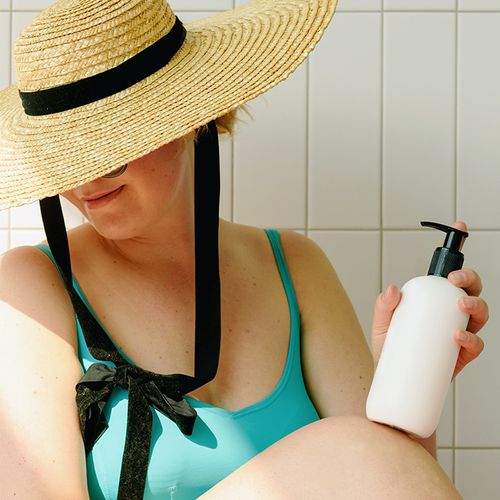The US Food and Drug Administration said it will require new labeling for sunscreens to identify products that are best for reducing the risk of skin cancer, early skin aging and helping to prevent sunburn.
Under the new rule, sunscreens that protect against both ultraviolet A rays (UVA) and ultraviolet B (UVB) rays can be labeled "Broad Spectrum." UVB rays and UVA rays both can cause sunburn, skin cancer and premature skin aging; UVB rays are the main source of sunburn, FDA officials explained.
The new rules will also require sunscreens to have a sun protection factor (SPF) of 15 or more or they won't be able to claim that they help prevent sunburn and possibly reduce the threat of premature skin aging and skin cancer-if used with other measures to protect against the sun.
"Sunscreens that meet the new test for Broad Spectrum protection and are also SPF 15 or above can, for the first time, include the statement 'used as directed reduces the risk of early skin aging and skin cancer when used with other sun protection measures,'" Janet Woodcock, MD, director of the FDA's Center for Drug Evaluation, said during the news conference.
The new labels will, for the most part, not be seen until summer 2012, she said.
What The Labels Will Say
Sunscreens with a SPF of 2 to 14 can be labeled as "Broad Spectrum," but only those Broad Spectrum products with an SPF of 15 or more can claim they reduce the risk of skin cancer and early skin aging, according to the new regulation.
Any sunscreen that is not Broad Spectrum or a Broad Spectrum sunscreen with an SPF between 2 and 14 will have to carry a warning saying the product has not been found to prevent skin cancer or early skin aging.
Sunscreens labels will also have a "Drug Fact Box," Dr. Woodcock said. And, sunscreens can no longer be called sunblocks, she said, "because we don't want to give the impression that complete protection is provided."
In addition, sunscreens can no longer claim they protect for more than two hours, without approval from the FDA, Dr. Woodcock said. The products will also no longer be allowed to state that they are waterproof and sweat-proof. Products can, however, claim to be water-resistant for 40 to 80 minutes. The amount of time the product remains effective must be stated on the label, Dr. Woodcock added.
Expert Reaction
One expert applauded the FDA move.
"Consumers need simplified and user-friendly guidelines to help them choose an effective sunscreen. The new guidelines will make it easier for dermatologists to make recommendations about sunscreens and for consumers to choose an effective sunscreen to protect their skin," Jennifer A. Stein, MD, PhD, assistant professor in the department of dermatology at New York University School of Medicine in New York City. "These new guidelines are a major step in the right direction to help better protect Americans from the dangers of sunburn and helping them reduce their risk of developing skin cancer in their lifetime."
Jeffrey C. Salomon, MD, an assistant clinical professor of plastic surgery at Yale University School of Medicine, said, "The new FDA guidelines for sunscreens reflect the confusion for both consumers and health professionals in the realm of sunscreen efficacy."
"It is welcome news that the term 'Broad Spectrum' now specifically endorses the concept of UVA and UVB protection in a sunscreen product," said Dr. Salomon.
Another Rule Proposed
The FDA is also proposing another rule that would limit the maximum SPF value on sunscreen labels to "50+".
The reason: SPF values above 50 have not been shown to give any better protection than an SPF 50 product, Dr. Woodcock said.
The agency is asking the public to submit data on the effectiveness and safety of sunscreen sprays and to suggest possible warnings that might be applied to the labels of these products. It is also providing information to the makers of sunscreens to help them comply with the new rules.
Finally, the FDA is starting to look into the safety of the active ingredients in sunscreens, Dr. Woodcock said.
Top-Rated Moisturizers with Real Sun Protection
Each year, the Environmental Working Group L (EWG) evaluates products that offer broad-spectrum (UV-A and UV-B) protection from the sun.
EWG's analyses show that most moisturizers with SPF don't give long-lasting protection. Some of the top-rated products that do get EWG's recommendation…
- Devita International. Daily Solar Protective Moisturizer 30
- Herbal Choice Mari. Face & Body Lotion Sweet Orange, SPF 30
- Keys Soap. Solar Rx Cosmetic Moisturizing Sunblock, SPF 30
- Marie Veronique Organics. Moisturizing Face Screen (with and without tint) and Face Screen Plus (with and without tint), SPF 30
- Suntegrity Skincare. All Natural Moisturizing Face Protection, SPF 30
Melanoma More Common In Parkinson's Patients
When 2,106 adults with Parkinson's disease (average age 68) underwent skin cancer screenings, they were found to be more than twice as likely to have melanoma than adults of the same age in the general population.
Implication: Anyone with Parkinson's disease should receive routine full-body skin exams (as often as recommended by a dermatologist) and report any changes in the shape, color and/or size of moles to their physicians.
